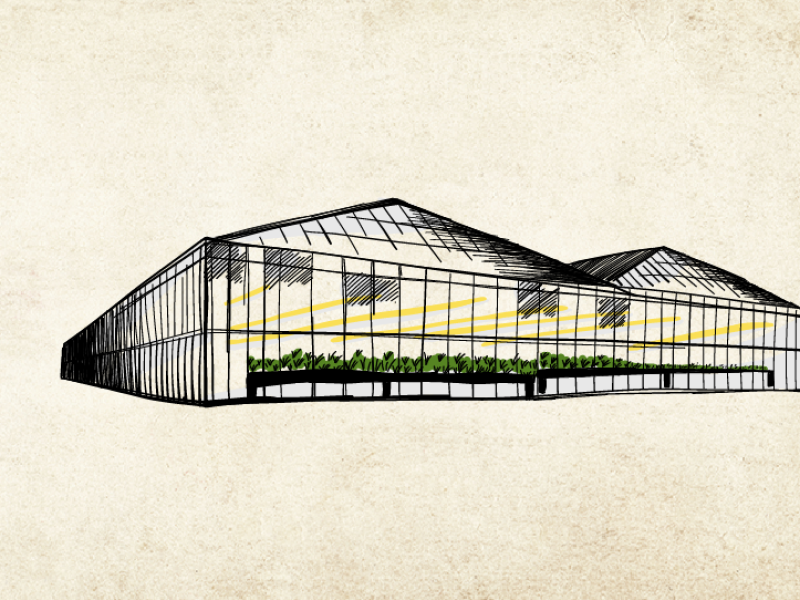As the world is facing the effects of climate change, agriculture will have to adapt to extended periods of drought, flooding, and mitigate pests and diseases. Understanding the molecular mechanisms underlying plant growth is the starting point for the development of climate-resilient crops. The VIB-UGent Center for Plant Systems Biology is known as one of the world-leading research centers in plant science. Their long-standing tradition of translating ground-breaking research findings into successful companies was the driving force behind the origin of a flourishing agribiotech ecosystem in Ghent – a strong and international ecosystem where innovative ideas grow into agricultural applications and technologies that benefit society.
Plant science as one of the cornerstones of VIB research
At the VIB-UGent Center for Plant Systems Biology (PSB), led by Professor Dirk Inzé, more than 350 scientists study the cellular mechanisms that orchestrate plant growth and responses to the environment. The aim of PSB is to apply novel insights from curiosity-driven research into climate-sustainable solutions. One of the plant traits most susceptible to climate change is crop productivity. Diverse abiotic stresses such as drought, flooding, high salinity, nutrient deficiency and heavy metals reduce crop yield. Elucidating the molecular mechanisms and physiological processes that contribute to increased stress tolerance at different developmental stages and in different organs, will help crops cope with varying environmental conditions. Much of the research within PSB is performed on Arabidopsis but also on Marchantia, duckweed, and economically-relevant crops such as maize, poplar, tomato, wheat and soybean. PSB has the ambition to accelerate the innovation cycle between lab and field. Maize and poplar have since long been used in PSB to validate novel biological insight even up to the level of field trials. Knowing how molecular pathways behave in field conditions and taking this information back to the lab – closing the lab-to-field-to-lab learning cycle – will be pivotal in translating basic research findings to suitable field applications.
Modern-day molecular biology wouldn’t exist without bioinformatics and computational biology, 2 strongholds of the center. The bioinformatics groups at PSB have ample expertise in polyploidy, ancient genome duplications, evolutionary genomics and comparative genomics and will continue to both generate fundamental insights and develop tools in these areas. This expertise will be crucial to link genes to climate-sustainable traits across species like maize, wheat, poplar and soybean. Breakthrough technologies are the foundation of scientific advances in both basic and translational research and PSB continues to invest and explore in these areas. During the last years, major efforts were made to uncover transcriptional information at high resolution using single-cell technologies. This capability will now be coupled to genome editing and efficient transformation pipelines to improve plant growth, yield, and climate resilience.
The green biotech hub in Ghent
VIB is a prime source of scientific expertise, technology, and business innovation which led to the origin of many successful new agribiotech companies. VIB’s first spin-off, Devgen, started with an RNA interference (RNAi) screening platform to combat nematode infections and turned into a seed company that uses RNAi for agricultural applications. In 2012, Syngenta acquired Devgen and maintained its research & development activities in the Syngenta Ghent Innovation Center. Biotalys – formerly called AgroSavfe – develops biological pest control products based on the Nanobody® technology, and is currently commercializing its first product Evoca™. More recent startups Aphea.bio and Protealis harness the power of bacteria to improve crop growth and yield. In this way, the agribiotech region in Ghent has grown over the years into a true ecosystem, full of talent and innovation. The VIB-UGent Center of Plant Systems Biology is one of the world-leading research centers in the field of plant science, not only catalyzing new ventures but also attracting collaborations with industry. In 2021, VIB signed an agreement with BASF to acquire their site in Nevele and upgrade the high-tech greenhouse facility into the VIB Agro-Incubator. The strategic location in the center of the agribiotech cluster in Ghent will lead to unique partnerships with research centers and companies. Furthermore, VIB intends to make the technology available and, provide expertise and access to the capabilities to support startups and entrepreneurs. The ambition of the VIB Agro-Incubator is to set up partnerships in the agro sector and expand the existing agribiotech ecosystem by supporting entrepreneurs with innovative ideas. The Agro-Incubator provides access to their high-tech greenhouse equipment and creates, together with the expertise of VIB and ILVO, an attractive support package for established and starting agribiotech companies. Especially young entrepreneurs will benefit from the Agro-Incubator’s mentorship, enabling them to grow in the field. Being at the heart of a blooming agribiotech ecosystem, VIB pioneers crop development for sustainable agriculture.
Prof Dr Dirk Inze, Science Director at VIB-UGent Center for Plant Systems Biology will be the closing keynote speaker on Tuesday, March 29 at the CROP innovation & business 2022 conference. Read more about his presentation.

